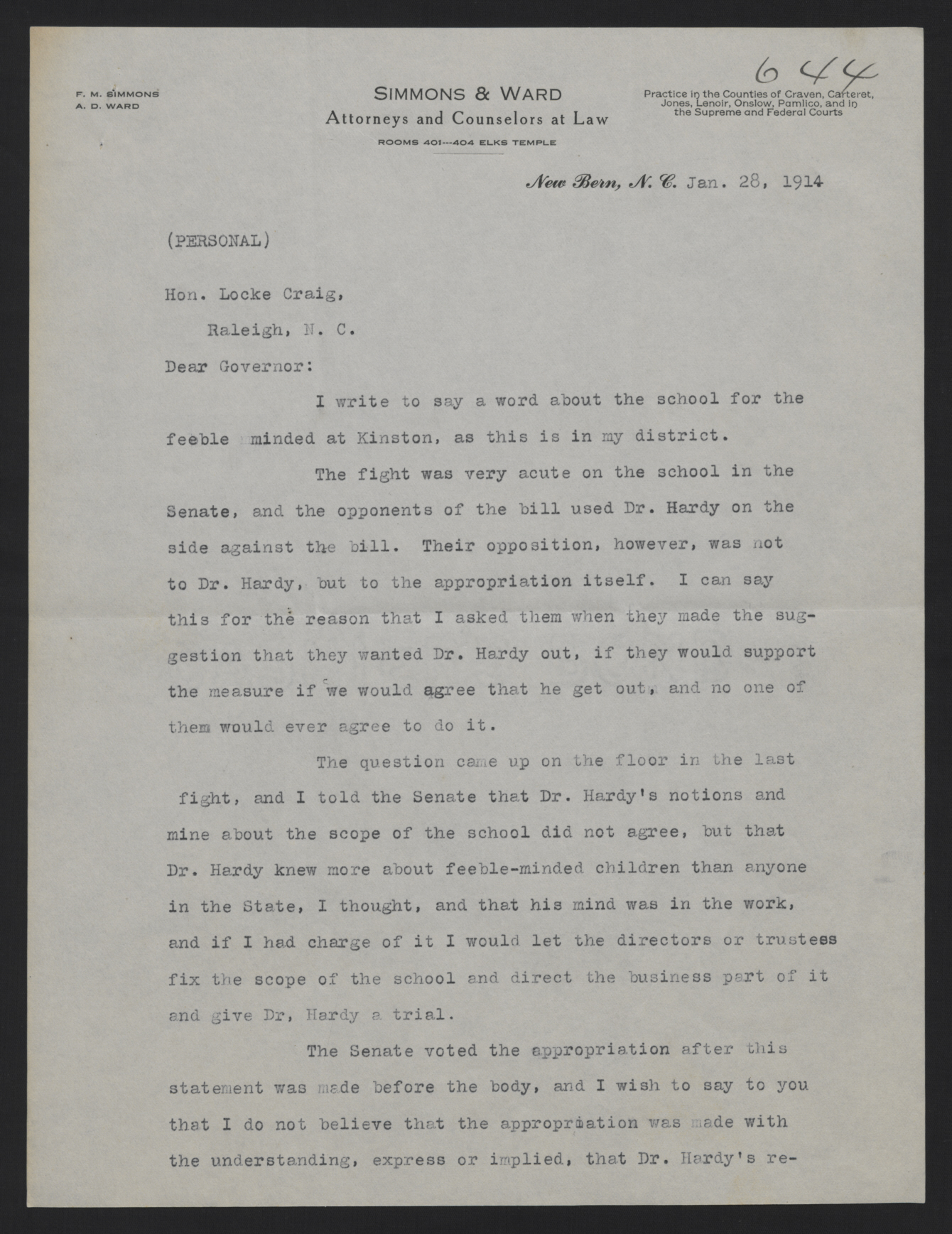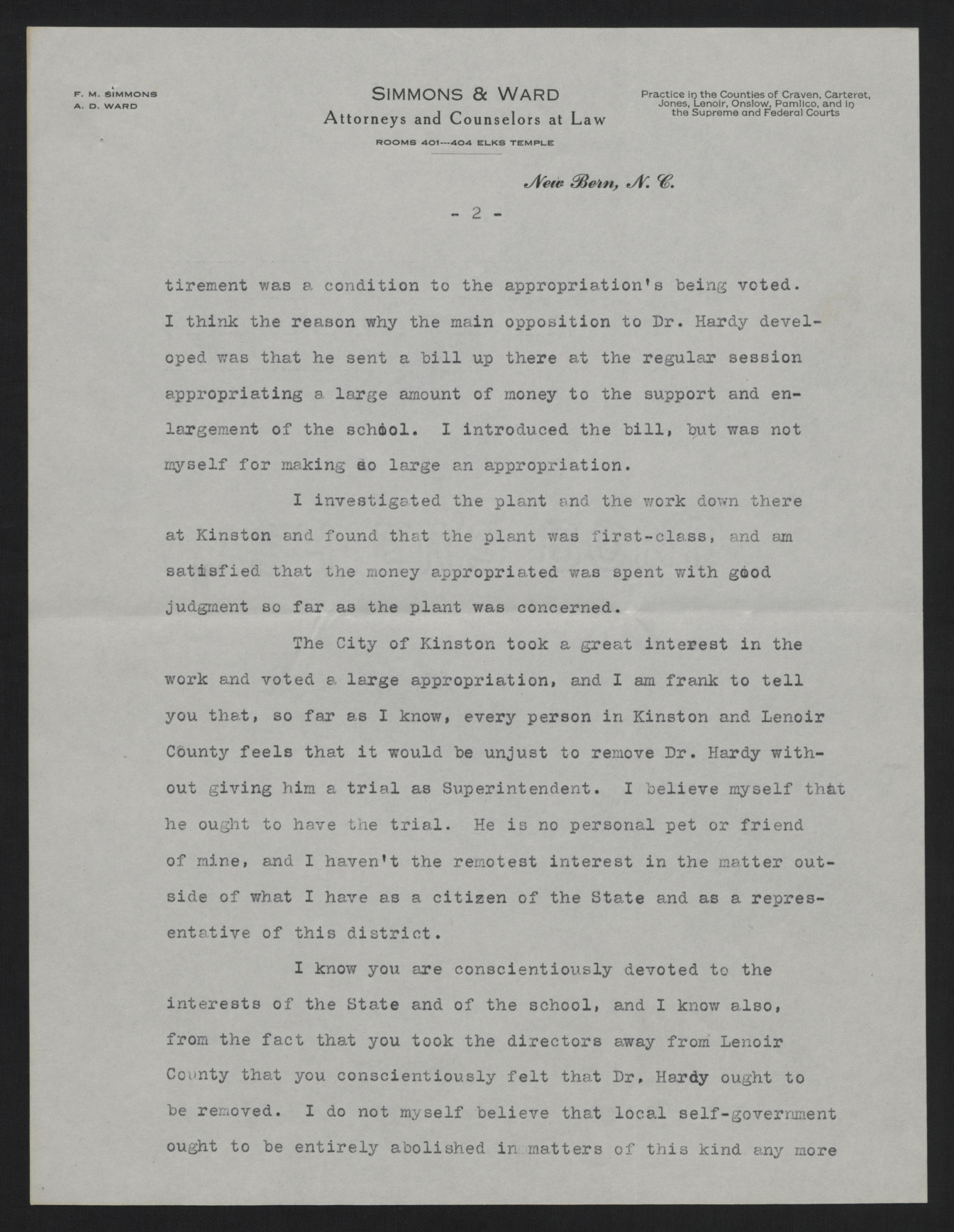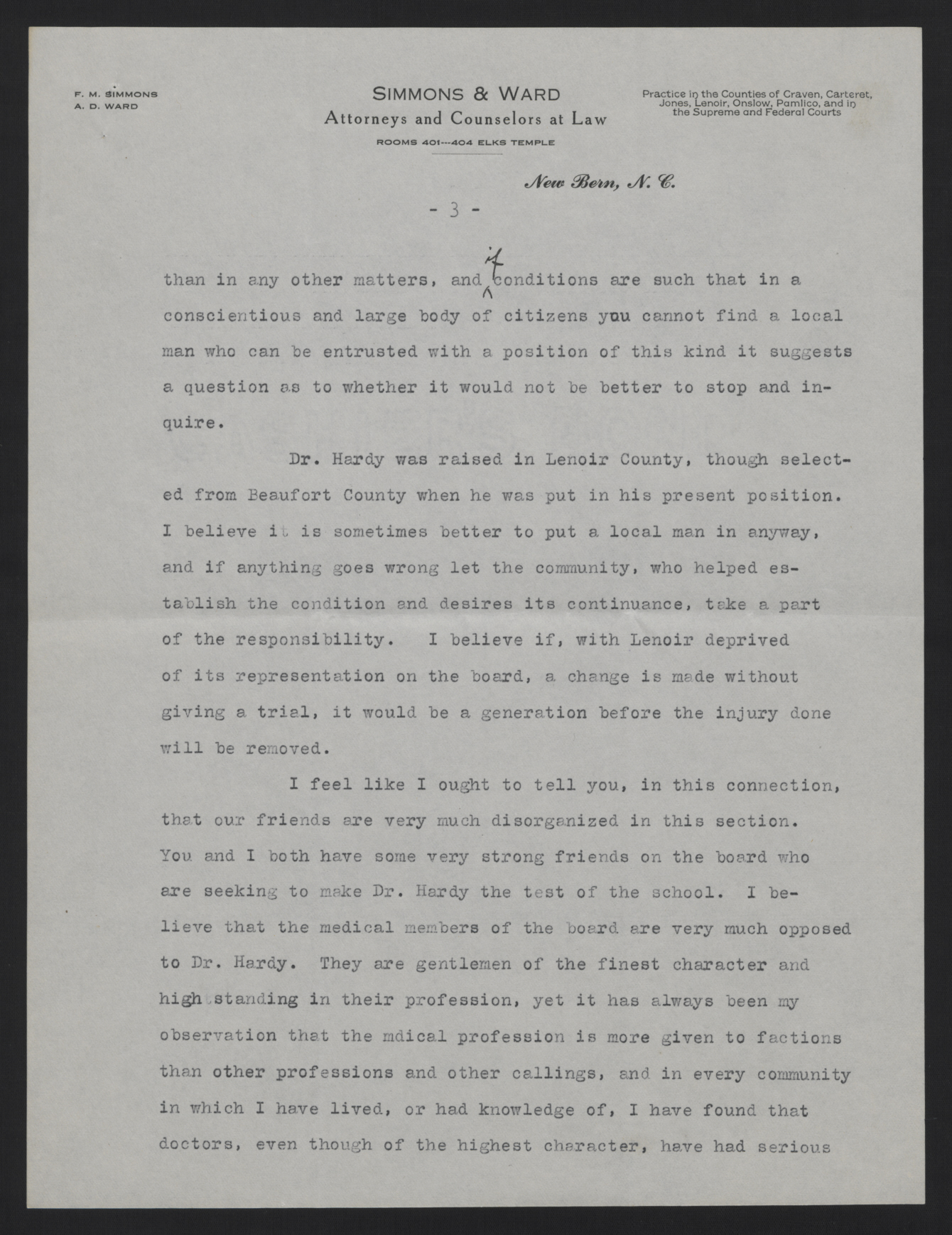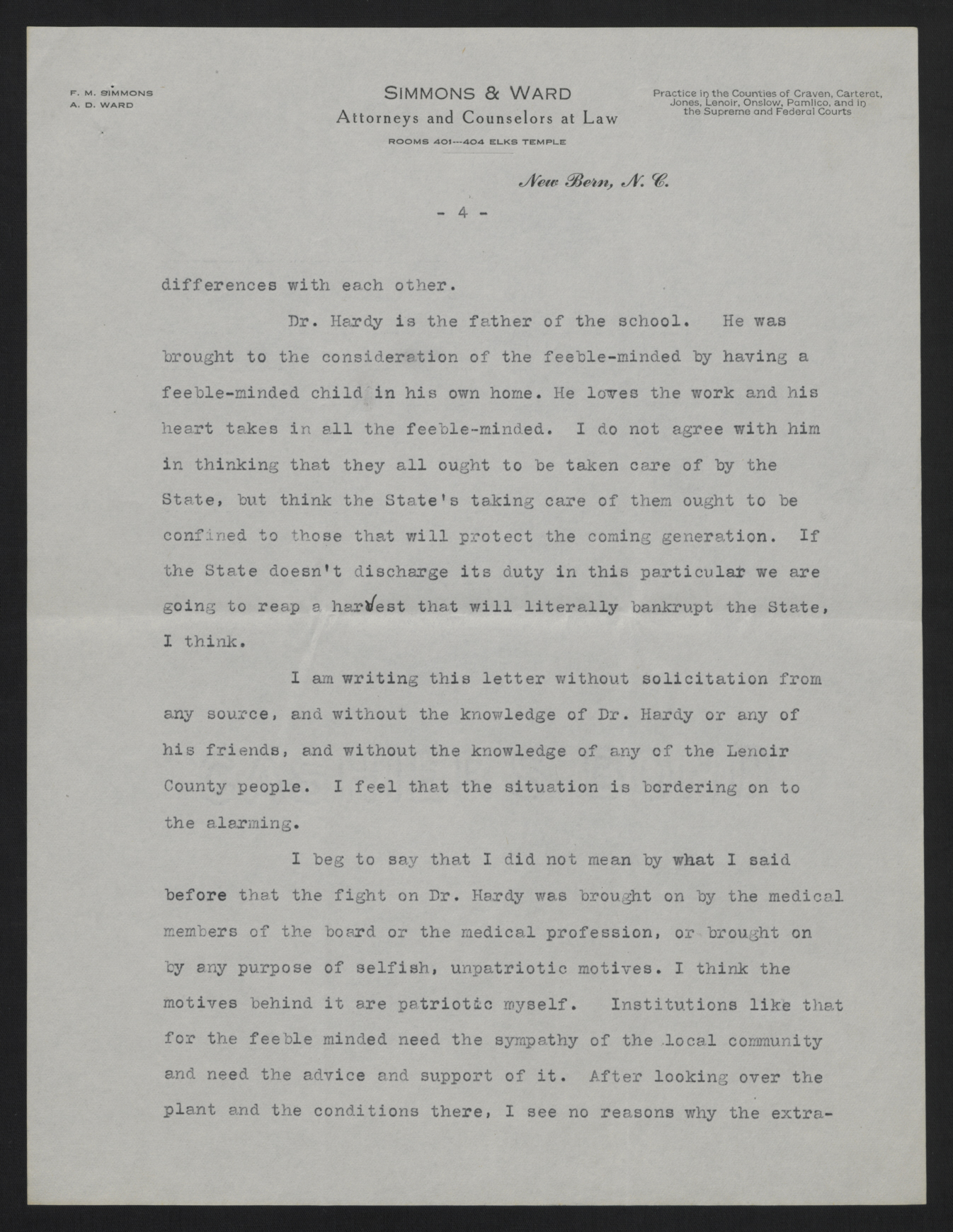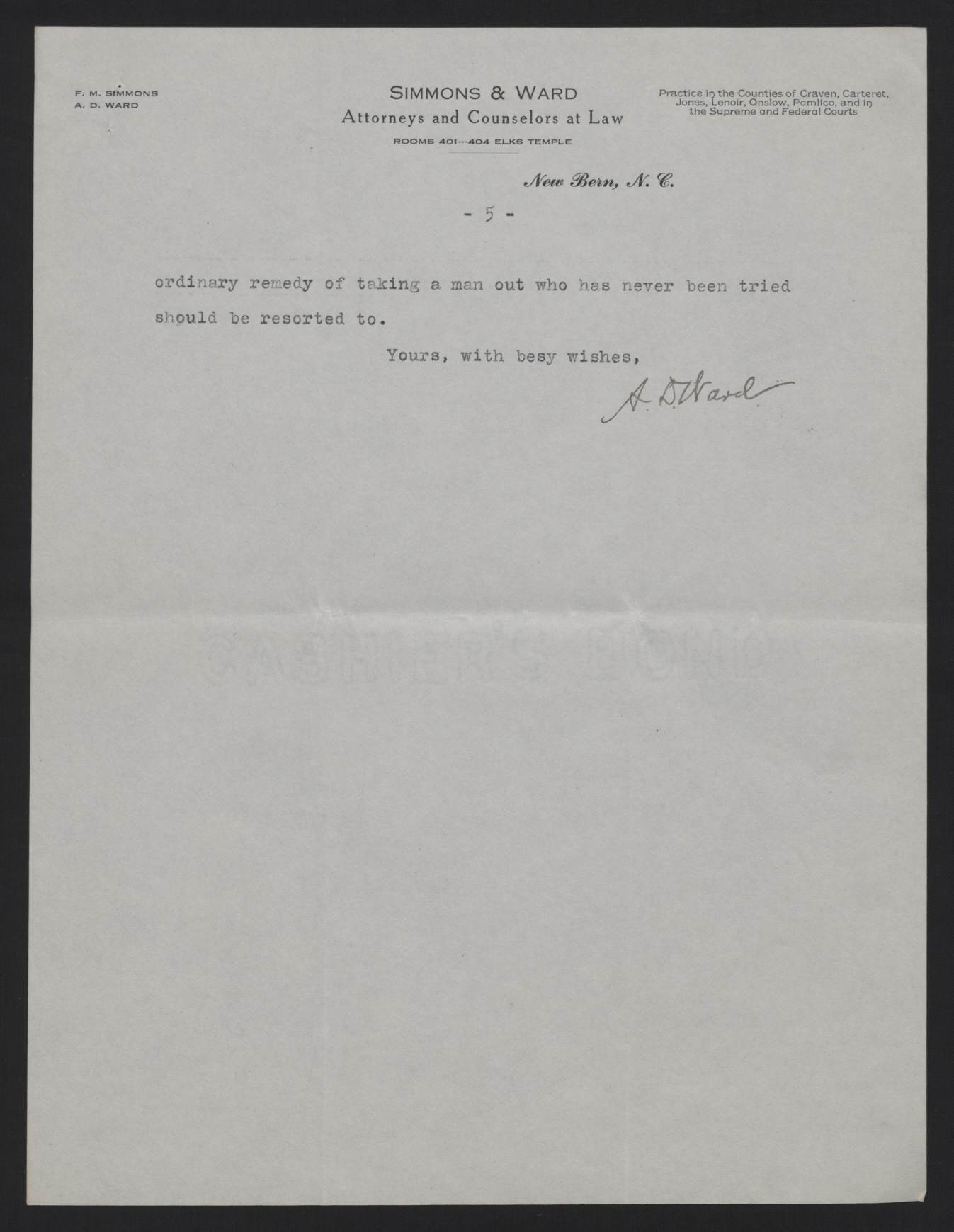SIMMONS & WARD
Attorneys and Counselors at Law
New Bern, N.C. Jan. 28, 1914
I write to say a word about the school for the feeble minded at Kinston, as this is in my district.
The fight was very acute on the school in the Senate, and the opponents of the bill used Dr. Hardy on the side against the bill. Their opposition, however, was not to Dr. Hardy, but to the appropriation itself. I can say this for the reason that I asked them when they made the suggestion that they wanted Dr. Hardy out, if they would support the measure if we would agree that he get out, and no one of them would ever agree to do it.
The question came up on the floor in the last fight, and I told the Senate that Dr. Hardy's notions and mine about the scope of the school did not agree, but that Dr. Hardy knew more about feeble-minded children than anyone in the State, I thought, and that his mind was in the work, and if I had charge of it I would let the directors or trustees fix the scope of the school and direct the business part of it and give Dr, Hardy a trial.
The Senate voted the appropriation after this statement was made before the body, and I wish to say to you that I do not believe that the appropriation was made with the understanding, express or implied, that Dr. Hardy's retirement was a condition to the appropriation's being voted. I think the reason why the main opposition to Dr. Hardy developed was that he sent a bill up there at the regular session appropriating a large amount of money to the support and enlargement of the school. I introduced the bill, but was not myself for making so large an appropriation.
I investigated the plant and the work down there at Kinston and found that the plant was first-class, and am satisfied that the money appropriated was spent with good judgment so far as the plant was concerned.
The City of Kinston took a great interest in the work and voted a large appropriation, and I am frank to tell you that, so far as I know, every person in Kinston and Lenoir County feels that it would be unjust to remove Dr. Hardy without giving him a trial as Superintendent. I believe myself that he ought to have the trial. He is no personal pet or friend of mine, and I haven't the remotest interest in the matter outside of what I have as a citizen of the State and as a representative of this district.
I know you are conscientiously devoted to the interests of the State and of the school, and I know also, from the fact that you took the directors away from Lenoir County that you conscientiously felt that Dr. Hardy ought to be removed. I do not myself believe that local self-government ought to be entirely abolished in matters of this kind any more than in any other matters, and if conditions are such that in a conscientious and large body of citizens you cannot find a local man who can be entrusted with a position of this kind it suggests a question as to whether it would not be better to stop and inquire.
Dr. Hardy was raised in Lenoir County, though selected from Beaufort County when he was put in his present position. I believe it is sometimes better to put a local man in anyway, and if anything goes wrong let the community, who helped establish the condition and desires its continuance, take a part of the responsibility. I believe if, with Lenoir deprived of its representation on the board, a change is made without giving a trial, it would be a generation before the injury done will be removed.
I feel like I ought to tell you, in this connection, that our friends are very much disorganized in this section. You and I both have some very strong friends on the board who are seeking to make Dr. Hardy the test of the school. I believe that the medical members of the board are very much opposed to Dr. Hardy. They are gentlemen of the finest character and high standing in their profession, yet it has always been my observation that the mdical profession is more given to factions than other professions and other callings, and in every community in which I have lived, or had knowledge of, I have found that doctors, even though of the highest character, have had serious differences with each other.
Dr. Hardy is the father of the school. He was brought to the consideration of the feeble-minded by having a feeble-minded child in his own home. He loves the work and his heart takes in all the feeble-minded. I do not agree with him in thinking that they all ought to be taken care of by the State, but think the State's taking care of them ought to be confined to those that will protect the coming generation. If the State doesn't discharge its duty in this particular we are going to reap a harvest that will literally bankrupt the State, I think.
I am writing this letter without solicitation from any source, and without the knowledge of Dr. Hardy or any of his friends, and without the knowledge of any of the Lenoir County people. I feel that the situation is bordering on to the alarming.
I beg to say that I did not mean by what I said before that the fight on Dr. Hardy was brought on by the medical members of the board or the medical profession, or brought on by any purpose of selfish, unpatriotic motives. I think the motives behind it are patriotic myself. Institutions like that for the feeble minded need the sympathy of the local community and need the advice and support of it. After looking over the plant and the conditions there, I see no reasons why the extraordinary remedy of taking a man out who has never been tried should be resorted to.
Yours, with besy wishes,

